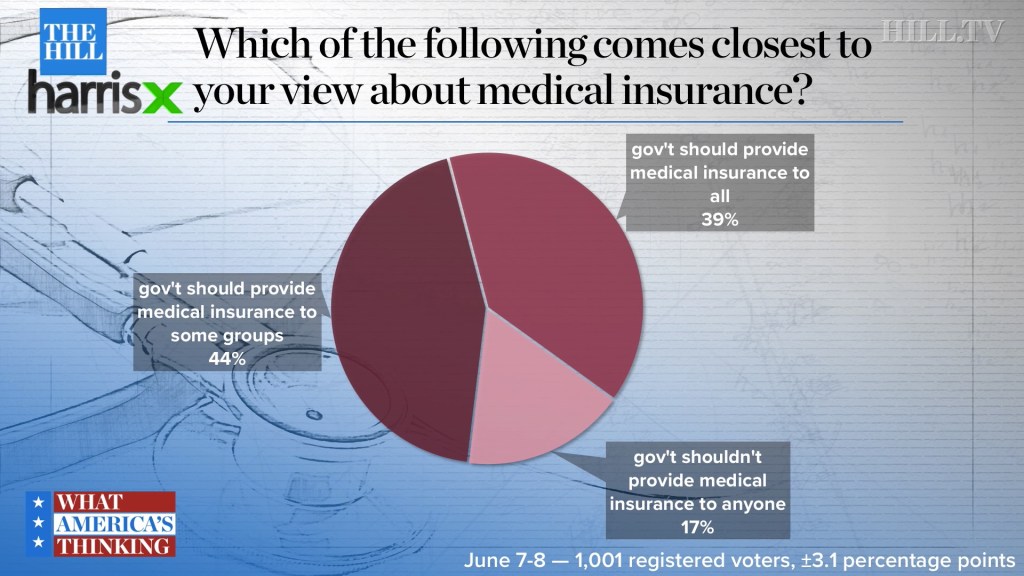Americans are less likely to support expanding the number of people covered by government health insurance programs when asked how to pay for such an expansion, recent Hill-HarrisX polls suggest.
In a June 7-8 survey, a 44 percent plurality of registered voters said they want the government to provide medical insurance only to people who are disabled, elderly, or poor, which is similar to federal programs that are currently in place.
Thirty-nine percent of respondents said they backed the government providing universal health coverage while 17 percent said that they think everyone should pay for their own medical insurance.
The results are a stark difference from a similar Hill-HarrisX poll in October that found that 70 percent of registered voters said they supported providing Medicare to every American, including 52 percent of Republican respondents.
That poll did not ask how the program would be paid for.
The June study also differs from a February poll which found that 71 percent of registered voters wanted the government to provide some form of universal health care coverage, either through a “single-payer” system where private insurance plans would be abolished or allowing citizens to opt into government insurance or supplement their government coverage with private plans.
Polling on public opinion on health care policy has fluctuated, sometimes wildly, in recent years.
 “Folks are clearly saying the system is still sort of broken to some degree, but there isn’t a lot of consensus around how to fix it in one way or another,” Mohamed Younis, editor-in-chief of Gallup, told Hill.TV earlier this year.
“Folks are clearly saying the system is still sort of broken to some degree, but there isn’t a lot of consensus around how to fix it in one way or another,” Mohamed Younis, editor-in-chief of Gallup, told Hill.TV earlier this year.
Medicare for All has become a front-and-center issue within the 2020 Democratic presidential primary.
A number of candidates, following the lead of Sen. Bernie Sanders (I-Vt.), have embraced single-payer proposals while others, including lesser-known former Rep. John Delaney (D-Md.) have rejected them as politically risky and easy for conservatives to characterize as “socialist” programs.
“Medicare for All is bad policy for the country and bad politics for the Democratic Party. The Democratic nomination for president shouldn’t go to anyone who supports it, and Medicare-for-all shouldn’t be in the party’s 2020 platform,” Delaney wrote in a Washington Post essay published last week.
Citing the rise in health care costs in a May interview with ABC News, Sanders called the current U.S. health care system “dysfunctional” and said that implementing single-payer insurance would save individuals and the government money over time by eliminating extra layers of the private bureaucracy.
“We cannot sustain a system in which the cost of health care continues to soar,” he said.
A consistent majority of Democratic voters has favored expanding government health programs like Medicare or Medicaid to all Americans
In an April Kaiser survey, 74 percent of Democratic respondents said they had a positive reaction to the term “socialized medicine,” 87 percent said the same about “Medicare for All,” 83 percent were positive about “universal health coverage and 64 percent were positive about the term “single-payer health insurance system.”
—Matthew Sheffield
Copyright 2023 Nexstar Media Inc. All rights reserved. This material may not be published, broadcast, rewritten, or redistributed.
